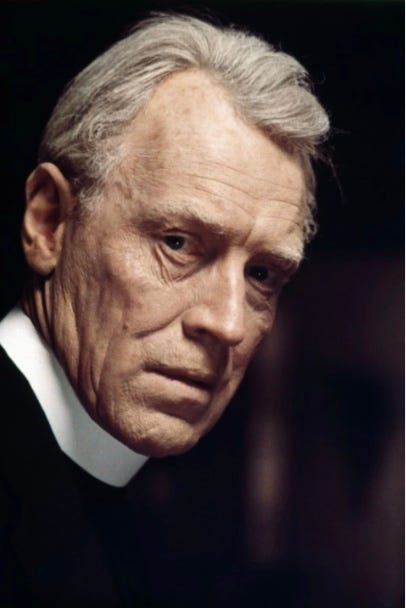Charles spoke to me in a nearly pitch dark room at three a.m., clearly on a roll: “I know you wanna leave, man, I see you pacing in and out, smokin’, starin’ at your car ready to hop in, ‘cause your disease ain’t done with you! You got a car, a job, a home, and it don’t like that!”
His words hit hard, Charles gripping the rests of the armchair. A surrealness more vivid than the demonic film discussed last week.
I had stopped booze cold turkey in summer; this was late December. The “anesthesia” took time to wear off. I somehow arrived in sober living, just before Christmas.
Now I felt like the possessed Regan McNeil, a struggle between light and dark clawing at me. Stark were the choices: sobriety or self-destruction. And yet I wavered…
Appalling, how deeply my father’s compulsion possessed me too, in a habit camouflaged in its ordinariness. Alcohol had long been the sixth member of the family. And like Reagan’s demon, this “loved one” died hard.
Before arriving here, evenings at home had become a series of insomniac nights with babbling ghosts. Have a drink, it’s inevitable. I learned about this facility and reluctantly checked in.
Now reluctance had exploded into an urge to flee. I paced in the small house in Northridge, owned by the remarkable Dr. Gloria Montgomery. She was warm, generous, and tough as nails; clean and sober herself, she had been through the wringer and knew whereof she spoke. Most of my fellow residents did not make it, as she warned.
One who did pull through was a mother with two children, living together in one room. “This is the last house on the block for me,” she said, a strong woman kicked around by circumstances and an abusive husband.
She understood the hopelessness, the tab coming due with interest. “It gets better, I swear. Just watch out for the ‘fuck-its,’” she said. This helped enormously. I wonder where she is now.
Gloria would close house meetings with prayers alluding to Christ. Whatever, thought this Jewish boy. I was broke as a joke and ready for anything.
What chilled now was the lack of any out. The through was studded with emotional landmines, after a lifetime of benumbed anguish.
How could it get better? I had never known “better.” It is so difficult for some to even imagine a less stressful life; sobriety like therapy often begins as a leap into the void. What if there is no ‘better’? What if it’s all just a cult, a sales job?
Except I had come to fear truly losing my mind, self-destructive impulses tugging at me, my sense of sanity unwinding in a most terrifying way. Anti-depressants were in the mix, so far without effectiveness.
Charles’ 3 a.m. monologue was a pivot point. Things (very) slowly turned after I decided to listen to what he said. Perhaps because it was at 3 a.m., the loneliest time imaginable, which had always frightened me in childhood, during insomniac nights of haunting images from The Exorcist, malignant spirits I (accurately) sensed threatening our family.
Charles was a resident, and Gloria’s cousin. He told me of praying to stay from downtown at three a.m. to score, and failing, under addiction’s demonic spell.
“I still wasn’t done,” he said in a raspy whisper, “after I landed in jail again, having to call Gloria again, that humiliation when she chewed my ass up. ‘How many chances you think you got, Charles?’ But she never gave up on me, and I ain’t givin’ up on you. C'mon man, stay.”
I was ashamed, thirty-two years old, flailing like a child. I grew up with lies in an alcoholic home, craving truth—well here it was and I wanted to run.
But I didn’t. I decided I would stay, a harrowing minute at a time. Alcohol could not win.
Where would I go, anyway? Back home, to the searing silence, and isolation? I was tired of living in the shadows, no companionship or screenwriting career to speak of. Booze got me nowhere but hungover and self-hating. Now everyone said things would improve. Could they all be wrong? How had my own plans panned out?
It was as if Charles was there by design. Desperation to feel better may have been the fuel for me, but trusting and deeply hearing him and others was the wheel, or GPS (I’m not a car person.)
I decided to trust his passion, and the words of Dr. Montgomery: “You have a healing heart…it’s written all over you. You’ll be helpful to others.” A startling notion. I did not yet believe it, but believed she did.
It had all started months earlier, in my therapist’s office. He comprehended my existential dilemma without flinching or judging. “You’re only getting in your own way,” he said with gentle firmness, “it’s time.”
I trusted what he must have glimpsed: a frightened man-child, hiding behind a mask of precocity and cleverness. Would I abandon that terrified kid, again?
In a strange way, and as Winnicott intimated, when our suffering becomes real for us, rather than something to minimize, or pass en route to the next exit, when we trust our experience as valid, even or especially when painful, standing before an empathic witness…then we are able to be touched by those who truly see us and our world, standing with confidence in their own; perhaps then we are no longer so cosmically alone, in a universe seeming so indifferent to our fate.






Good portrayal of alcoholism/addiction as a personal demon to be overcome. Does it have to be overcome - can a person live with a small demon or is that too much of a destructive presence? Thank you for the nuanced writing.